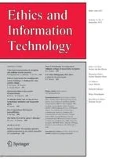Abstract
Can trust evolve on the Internet between virtual strangers? Recently, Pettit answered this question in the negative. Focusing on trust in the sense of ‘dynamic, interactive, and trusting’ reliance on other people, he distinguishes between two forms of trust: primary trust rests on the belief that the other is trustworthy, while the more subtle secondary kind of trust is premised on the belief that the other cherishes one’s esteem, and will, therefore, reply to an act of trust in kind (‘trust-responsiveness’). Based on this theory Pettit argues that trust between virtual strangers is impossible: they lack all evidence about one another, which prevents the imputation of trustworthiness and renders the reliance on trust-responsiveness ridiculous. I argue that this argument is flawed, both empirically and theoretically. In several virtual communities amazing acts of trust between pure virtuals have been observed. I propose that these can be explained as follows. On the one hand, social cues, reputation, reliance on third parties, and participation in (quasi-) institutions allow imputing trustworthiness to varying degrees. On the other, precisely trust-responsiveness is also relied upon, as a necessary supplement to primary trust. In virtual markets, esteem as a fair trader is coveted while it contributes to building up one’s reputation. In task groups, a hyperactive style of action may be adopted which amounts to assuming (not: inferring) trust. Trustors expect that their virtual co-workers will reply in kind while such an approach is to be considered the most appropriate in cyberspace. In non-task groups, finally, members often display intimacies while they are confident someone else ‘out there’ will return them. This is facilitated by the one-to-many, asynchronous mode of communication within mailing lists.
Similar content being viewed by others
References
P.E. Agre (2002) ArticleTitleReal-Time Politics: The Internet and the Political Process The Information Society 18 IssueID5 311–331 Occurrence Handle10.1080/01972240290075174
G. Brennan P. Pettit (2004) The Economy of Esteem: An Essay on Civil and Political Society Oxford University Press Oxford
B. Danet (2001) Cyberpl@y: Communicating Online Berg Oxford New York
P.B. de Laat. Open Source Software: A Case of Swift Trust? In T.W. Bynum, N. Pouloudi, S. Rogerson and Th. Spyrou, editors, Proceedings of the Seventh International Conference, ETHICOMP 2004, Challenges for the Citizen of the Information Society, pp. 250–265. Syros, Greece, April 1994. University of the Aegean, Syros.
J.S. Donath (1999) Identity and Deception in the Virtual Community M.A. Smith P. Kollock (Eds) Communities in Cyberspace Routledge London New York 29–59
H. Geser. “Yours Virtually Forever”: Death Memorials and Remembrance Sites in the WWW. Towards Cybersociety and Vireal Social Relations, Sociology in Switzerland, Online Publications, 1998. Available at <http://socio.ch/intcom/t_hgeser07.htm>, accessed 23 September 2005.
C. Handy (1995) ArticleTitleTrust and the Virtual Organization Harvard Business Review 73 IssueID3 40–50
G. Hertel S. Niedner S. Herrmann (2003) ArticleTitleMotivation of Software Developers in Open Source Projects: An Internet-Based Survey of Contributors to the Linux Kernel Research Policy 32: 1159–1177 Occurrence Handle10.1016/S0048-7333(03)00047-7
S.L. Jarvenpaa K. Knoll D.E. Leidner (1998) ArticleTitleIs Anybody Out There? Antecedents of Trust in Global Virtual Teams Journal of Management Information Systems 14 IssueID4 29–64
S.L. Jarvenpaa D.E. Leidner (1999) ArticleTitleCommunication and Trust in Global Virtual Teams Organization Science 10 IssueID6 791–815 Occurrence Handle10.1287/orsc.10.6.791
E. Katsh J. Rifkin A. Gaitenby (2000) ArticleTitleE-commerce, E-disputes, and E-dispute Resolution: In the Shadow of “eBay Law” Ohio State Journal of Dispute Resolution 15 IssueID3 705–734
J.E. Katz R.E. Rice (2002) Social Consequences of Internet Use: Access, Involvement, and Interaction MIT Press Cambridge MA
P. Kollock (1999) The Production of Trust in Online Markets E.J. Lawler M. Macy S. Thyne H.A. Walker (Eds) Advances in Group Processes 16 JAI Press Greenwich CT
N. Luhmann (1988) Familiarity, Confidence, Trust: Problems and Alternatives D. Gambetta (Eds) Trust: Making and Breaking Cooperative Relations Basil Blackwell Oxford 94–107
D. Meyerson K.E. Weick R.M. Kramer (1996) Swift Trust and Contemporary Groups R.M. Kramer T.R. Tyler (Eds) Trust in Organizations: Frontiers of Theory and Research Sage Thousand Oaks CA 166–195
H. Nissenbaum (2001) ArticleTitleSecuring Trust Online: Wisdom or Oxymoron? Boston University Law Review 81 635–664
H.H. Perritt SuffixJr (2000) ArticleTitleDispute Resolution in Cyberspace: Demand for New Forms of ADR Ohio State Journal of Conflict Resolution 15 675ff
P. Pettit (1995) ArticleTitleThe Cunning of Trust Philosophy and Public Affairs 24 IssueID3 202–225
P. Pettit (2004) ArticleTitleTrust, Reliance and the Internet Analyse und Kritik 26 108–121
P. Resnick R. Zeckhauser E. Friedman K. Kuwabara (2000) ArticleTitleReputation Systems Communications of the ACM 43 IssueID12 45–48 Occurrence Handle10.1145/355112.355122
H. Rheingold (2000) The Virtual Community: Homesteading on the Electronic Frontier. Revised ed MIT Press Cambridge MA
J. Roberts (2000) ArticleTitleFrom Know-How to Show-How? Questioning the Role of Information and Communication Technologies in Knowledge Transfer Technology Analysis & Strategic Management 12 IssueID4 429–443
J.W. Turner J.A. Grube J. Meyers (2001) ArticleTitleDeveloping an Optimal Match within Online Communities: An Exploration of CMC Support Communities and Traditional Support Journal of Communication 51 IssueID2 231–251
S.E. Watt M. Lea R. Spears (2002) How Social is Internet Communication? A Reappraisal of Bandwidth and Anonymity Effects S. Woolgar (Eds) Virtual Society? Technology, Cyberbole, Reality Oxford University Press Oxford 61–77
B. Wellman M. Gulia (1999) Net Surfers Don’t Ride Alone: Virtual Communities as Communities M.A. Smith P. Kollock (Eds) Communities in Cyberspace Routledge London New York 167–194
L.G. Zucker (1986) ArticleTitleProduction of Trust: Institutional Sources of Economic Structure, 1840–1920 Research in Organizational Behavior 8 53–111
Author information
Authors and Affiliations
Corresponding author
Rights and permissions
About this article
Cite this article
de Laat, P.B. Trusting Virtual Trust. Ethics Inf Technol 7, 167–180 (2005). https://doi.org/10.1007/s10676-006-0002-6
Issue Date:
DOI: https://doi.org/10.1007/s10676-006-0002-6




